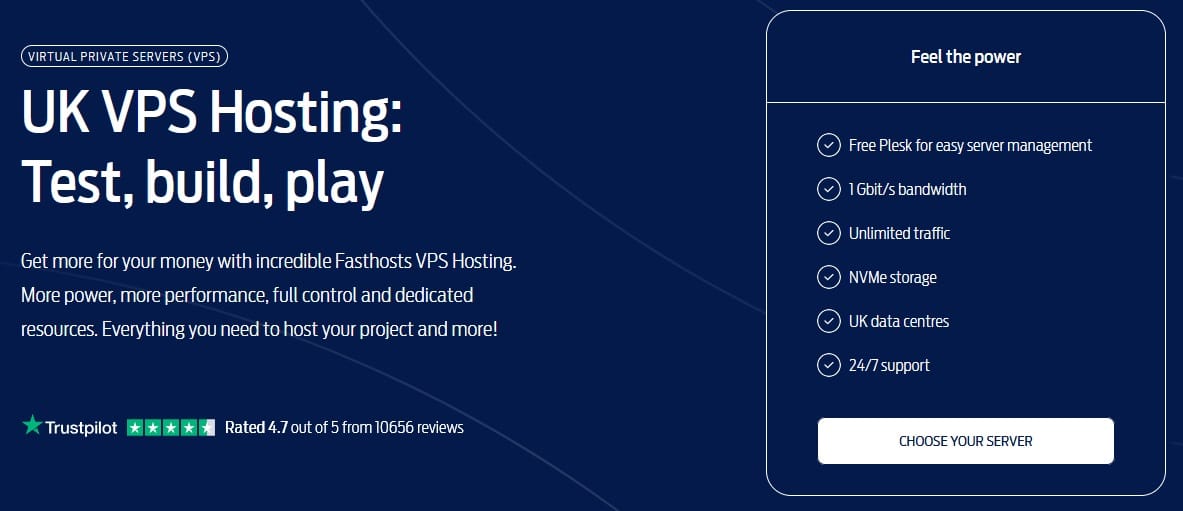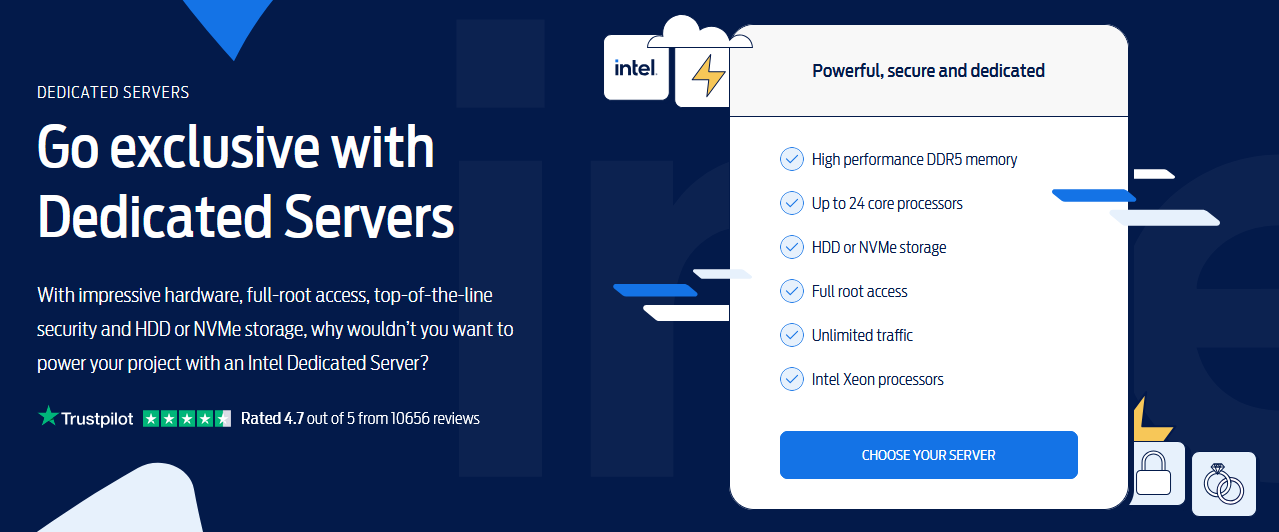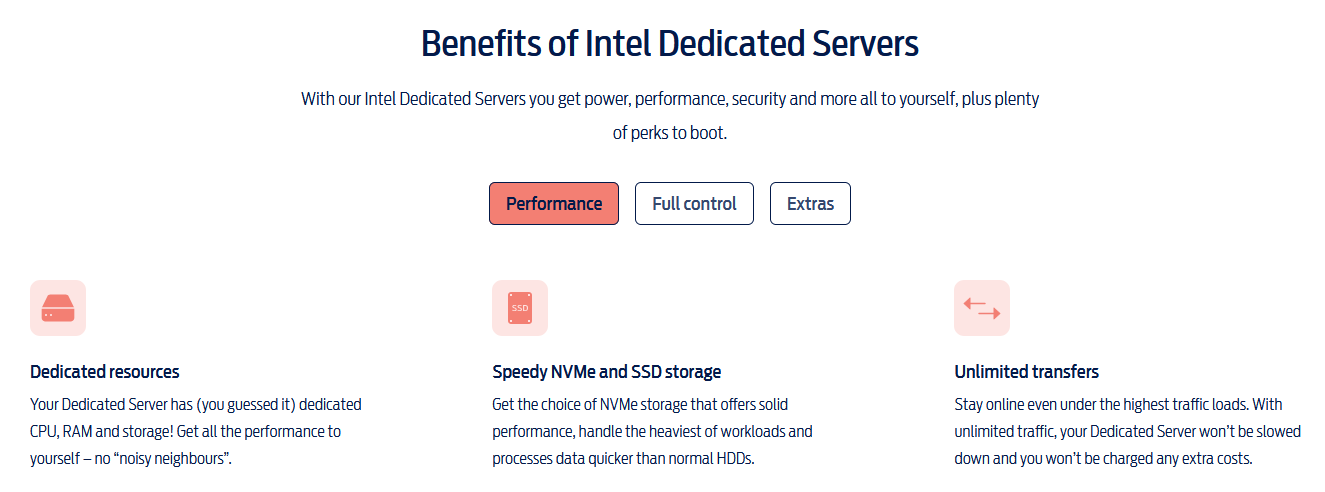So you know you want a server but whilst scoping out your options you’ve come face-to-face with a whole host of server types. Two of the most popular options are virtual private servers (VPS) and dedicated servers. But which one should you choose for your project? Well, there’s more to deciding than just the price, so we’re here to look at VPS vs dedicated servers, giving you the info you need to decide.
What are virtual private servers?

First, let’s start with a quick intro to what a VPS is. Also known as a virtual private server, a VPS is pretty much what it sounds like – it’s a virtual server and it’s private. It’s a middle ground between shared hosting and a full-blown dedicated server. Like shared web hosting, you share server space with others. But instead of battling for better performance, you get your own dedicated resources, meaning you won’t be restricted by the bottlenecks caused by multiple users sharing the same single resource.
Getting more technical, it starts off with a physical server being sectioned up to run several virtual servers through the use of hypervisor software, which isolates these separate virtual servers and allows each one to run its own operating system, software and settings on the same physical server. When you provision a VPS, you’re getting one of these virtual servers, keeping all the CPU, RAM and storage to yourself. It’s kind of like renting a flat in a multi-tenant building.
Because of their flexibility, there are a lot of things you can do with a VPS. They’re great for smaller businesses looking to boost their site performance, as a test environment for developers, or even as a gaming server. So there are many reasons why you should consider a virtual private server.
The pros and cons of a VPS

Let us take a look at the good and bad of virtual private servers:
VPS pros
1. Performance
A VPS offers superior performance compared to shared hosting thanks to each virtual server’s dedicated resources. This means no more sharing resources with noisy neighbours who slow down your projects.
2. Cost
A VPS is cheaper than a dedicated server because you’re only renting part of a server rather than a whole one. This means costs can be shared between multiple customers.
Here at Fasthosts, our smallest VPS packages start from just £3 per month. So, you can get dedicated resources, full root access and super-fast speeds even if you have only a small monthly budget.
3. Flexibility and scalability
These servers are flexible if you need to upgrade your server specs as your project grows. Start with a small VPS for your new website, and then as your monthly traffic increases, you can simply add more virtual resources via your control panel to meet this increasing demand.
4. Control
Since each virtual server is totally isolated and independent, you can choose your own operating system and server settings to customise your VPS to your exact project requirements. Whether you prefer a Windows VPS or Linux VPS, you get full control over your server with a VPS that’s tailored to your preferences.
VPS cons
1. Not as powerful as dedicated
Despite their superior power compared to shared servers, virtual private servers don’t match the performance and resources you get with dedicated servers, as you’re still only getting access to a portion of a physical server. This means they’re not as suited to larger projects as dedicated servers, which offer more resources and power to handle high-traffic ecommerce websites, complex development tasks, high-performance computing, database management, machine learning and more.
2. Still sharing
Although VPSs are isolated and independent, you’re still technically sharing server space with other customers. Therefore, you could still potentially be affected by other customers on the server. So if a customer experiences a cyber attack, this could lead to downtime and security vulnerabilities for you (although this isn’t as likely as it would be with shared hosting).
3. More technical knowledge required
A VPS requires more technical knowledge than shared web hosting because you’re in charge of configuring server settings. The benefit is that you get more control, but this means more time spent on server management and maintenance.
What can you use a VPS for?
So, with all of this in mind, who is the ideal VPS customer and what can these servers be used for?
1. Website hosting
A VPS is powerful enough to host high-traffic websites, including popular blogs, business websites and ecommerce sites. Shared hosting is powerful enough for small blogs or personal portfolios, but once your traffic increases, a VPS is a great choice – especially as it’s easily scalable as your site grows.
2. Gaming servers
VPSs are commonly used to host gaming servers for small-to-medium-sized groups or for less graphically intensive games. For example, if you want to run a lightly modded Minecraft server for several friends, a VPS is your best bet.
3. Testing
For developers, a VPS is a fantastic testing and staging environment thanks to its reliable performance, security and full root access.
4. Forex trading
Hoping to get into Forex trading as a side hustle? A Forex VPS gives you the performance, scalability and security you need to maximise your investments.
5. VPN
Browse the internet securely and privately by hosting your own VPN (virtual private network) on your VPS. This will also enable you to access geo-restricted content, such as Netflix shows that aren’t available in your country.
What are dedicated servers?

Dedicated servers are similar to VPS, but instead of getting one of many virtual servers within a physical machine, you get the entire physical server to yourself. If we continue the flat analogy, getting a dedicated server is like buying the whole building. As it says in the name (similar to VPS), your resources are dedicated to you and only you.
Dedicated server hosting is ideal for those looking for big resource amounts from the start. If you’re running high-traffic sites, working on intensive ecommerce websites, developing big applications or handling large amounts of data, a dedicated server will tick all the boxes.
The pros and cons of dedicated servers
If a VPS isn’t the right fit for you, maybe dedicated server hosting is? Let’s run through the pros and the cons of this type of server:

Dedicated server pros
1. Resources
A dedicated server gives you massive amounts of resources from the start, so no matter what you need your server for, you’ll always have plenty of resources to get your projects done.
2. Performance
These servers offer great performance for larger projects. Even if you’re hosting multiple ecommerce sites or managing extensive databases, a dedicated server has the power needed to run your projects smoothly and efficiently. This is ideal if you need to ensure top-notch performance and user experience for your sites.
3. No need to upgrade
A dedicated server starts big, so this saves having to upgrade as your project grows. Whilst virtual servers are very scalable, dedicated servers offer greater convenience by removing the need to scale up in the first place.
4. Total control
Dedicated servers also offer full root access and the ability to customise your server however you wish, but the fact that you’re the only customer on the server means you have even more control over server hardware.
Dedicated server cons
1. Expensive
As you can imagine, a dedicated server is one of the more expensive server options. All of this power and control comes at a cost, so you’ll need a much larger monthly budget if you want to run a dedicated server.
2. Technical expertise required
Since you have full control over the server, this requires more technical knowledge than other servers, which come with more involvement from the hosting provider. If you want a dedicated server, you’ll need your own IT team or prior experience with hosting.
3. Lack of flexibility
Dedicated servers aren’t as flexible as other options like virtual private servers and cloud servers. These options allow you to add virtual resources to your plan via your control panel at any time, but since you’re constrained by physical limitations with a dedicated server, you won’t have this option (although you’ll have more resources from the start).
What can you use a dedicated server for?
With the enhanced performance of a dedicated server, you can take on even more demanding projects, including:
1. Hosting high-traffic ecommerce websites
For high-traffic ecommerce sites, a dedicated server is needed to handle the processing of many simultaneous transactions. The superior performance of these servers means that these requests can be processed rapidly, without causing frustrating performance issues for customers.
2. Hosting multiple websites
Not only can you host websites with much higher traffic loads (such as ecommerce websites during peak periods), but you can also host multiple high-traffic websites thanks to the huge amount of resources you get from the start with a dedicated server. This makes dedicated servers ideal for large enterprises with multiple business ventures or websites for different countries.
3. Gaming servers
If your VPS isn’t quite powerful enough to handle your gaming server without lag, you may need to upgrade to a dedicated server. Resource-intensive games, heavily modded servers and servers with lots of players will need the power of a dedicated gaming server.
4. Database management
The extra storage capacity of dedicated servers makes them perfect for managing large databases. If you need to store a large number of files or archived data, a dedicated server may be the best choice.
Need even more storage capacity? Choose one of our storage servers for securely managing even the largest databases. Our storage servers come with up to 96TB of storage for all of your files and data backups.
5. AI and machine learning
If you want to analyse huge sets of data and develop machine learning algorithms, you need the superior power of a dedicated server to perform these complex computations. So, for high-performance computing, machine learning and other resource-intensive projects, you need dedicated hosting.
Which should you choose: VPS or dedicated server hosting?
Now you might be wondering, if they both give you dedicated resources, how are they different? When it comes to the VPS vs dedicated server hosting debate, there are some key differences to think about before choosing which is right for you. So what exactly is the difference between a VPS and dedicated servers?
VPS or dedicated server: Control
Depending on the hosting provider you choose, the amount of control you get with a virtual private server vs a dedicated server can be fairly similar. One of the biggest factors is whether you choose one that’s managed or unmanaged. If you go for unmanaged, like our servers at Fasthosts, you get absolute control. Both a VPS and dedicated server will offer full root access, meaning you call all the shots when it comes to how it’s set up, what software is installed and how your backups are managed.
It’s worth noting that some dedicated servers come with BIOS-level controls that you wouldn’t get with a VPS. This means you can manage low-level things like power consumption, boot-loaders and hardware-level security. With a VPS, these would all be defined by the host and aren’t things you’d be able to change.
The advantage of VPS is that you do get a bit more control over your resources, with the ability to scale up your CPU, RAM and storage as and when you need to, which leads us to our next point about scalability…
Dedicated server vs VPS: Scalability
We mentioned scaling resources on a VPS and this is probably one of the most significant differences when it comes to virtual servers vs dedicated server hosting. A virtual private server offers a lot more flexibility, with the ability to increase the amount and distribution of CPU cores, RAM and storage capacity as your project grows.
Dedicated server hosting doesn’t offer as much scalability. In fact, what it does offer is very limited. Because it’s a physical server, it’s much more difficult to upgrade your specs and would likely lead to some downtime for migration to another server.
Dedicated server vs VPS: Resources
The resources a server has to offer is no doubt a big deal. You wouldn’t build something without knowing you had the materials you needed to finish the project, would you? Well, it’s the same with digital projects. If you're going to build a site or develop an application, you need to make sure you’ve got the space to build it and the power to run it. Dedicated servers and VPSs both have their own approach to resources, each one being better suited to some use cases than others.
VPSs are more of a ‘start small and grow’ option. They’re great for projects where you might only need a smaller amount of resources to start with, with the ability to upgrade as your project grows. Dedicated servers, however, are beefy from the get-go. You’ll get more powerful CPUs, more RAM and bigger storage drives, ideal for projects you know you’ll need more resources for.
VPS vs dedicated hosting: Performance
Resources and performance kind of go hand in hand, so you can probably guess the answer to VPS vs dedicated server in terms of performance. Dedicated servers come with huge amounts of resources, meaning that, depending on what you use them for, they can offer higher levels of performance.
But that’s not to say that a virtual server doesn’t offer great performance too. In fact, there are VPSs available that offer powerful specs that would be more than enough for a wide range of projects.
Both a dedicated server and VPS can offer the power you need to manage multiple sites, databases, and projects on one server, with enough power to go around so your overall performance isn’t affected. Which one you’d choose would be down to the size of your project and other things like the flexibility you need and your budget.
VPS hosting vs dedicated server: Price
Another big difference between VPS and dedicated server hosting is the price. Big resources come with a big price tag, so it’s a given that dedicated servers will be more expensive than a VPS. But if you know that it’s the best hosting for your project and you’re getting the best levels of performance out there, then it’s definitely worth it.
If you don’t need all that power and are looking to start smaller, a cheap VPS server will make less of a dent in your wallet. Plus, you can always increase resources if you need to. There are higher-tier virtual servers that will offer a boost in performance compared to cheaper ranges, but obviously, these will also have a bigger price tag.
|
Virtual Private Servers |
Dedicated Servers |
|
|---|---|---|
| Control |
|
|
| Scalability |
|
|
| Resources |
|
|
| Performance |
|
|
| Price |
|
|
